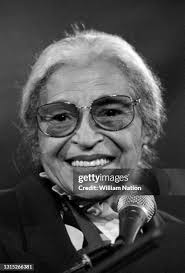
Introduction
Rosa Parks, often referred to as the “mother of the civil rights movement,” is a figure whose actions and legacy continue to inspire millions. Her refusal to give up her bus seat to a white passenger in Montgomery, Alabama on December 1, 1955, was not just a simple act of defiance; it was a pivotal moment that would ignite the United States’ civil rights movement. Parks’ courage brought issues of racial segregation and discrimination to the forefront, making her a symbol of resistance against injustice.
The Historical Context
During the 1950s, African Americans in the South faced systemic racism and segregation enforced by Jim Crow laws. Public transportation in Montgomery was segregated, requiring Black passengers to sit at the back of the bus. Parks, an active member of the NAACP, understood the implications of her actions. Her arrest prompted a 381-day Montgomery Bus Boycott, led by a young Martin Luther King Jr. This event not only challenged the legality of segregation but also united the African American community in a common cause.
Parks’ Impact and Legacy
Rosa Parks’ actions and the subsequent boycott led to a Supreme Court ruling that declared segregation on public buses unconstitutional in 1956. This watershed moment marked the beginning of a series of protests and legislative efforts that would eventually bring about significant civil rights advancements, including the Civil Rights Act of 1964. Parks continued to advocate for social justice throughout her life, participating in marches, speaking engagements, and community organizing. She became a symbol of hope and resilience, inspiring future generations to fight for equality.
Conclusion
Rosa Parks passed away on October 24, 2005, but her legacy endures. Each year, Rosa Parks Day is celebrated in various states, reminding us of her contribution to civil rights and social change. Her story emphasizes the power of individual action in the fight against systemic oppression. As current movements for racial equality continue to arise, Parks’ enduring influence serves as a rallying point for those seeking justice. The lessons learned from her bravery remain relevant today, highlighting the continual struggle against discrimination and the importance of standing up for one’s beliefs.






